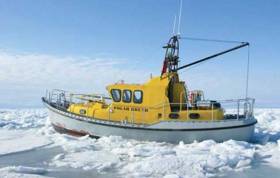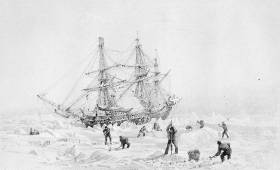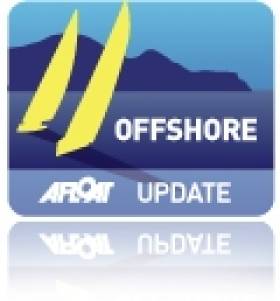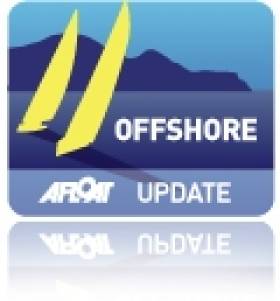Displaying items by tag: Northwest Passage
Ocean Cruising Club Award to First Woman to Navigate the Northwest Passage Single–handed
The Ocean Cruising Club (OCC) has announced the recipients of awards that recognise achievements in blue water sailing over the past 18 months. The recipients of these awards were selected from among those nominated by OCC members.
The Club’s premier award, the OCC Barton Cup, named after Humphrey Barton, founder of the OCC, goes to Germany’s Susanne Huber-Curphey, the first woman to navigate the
Northwest Passage singlehanded (west to east). She received extraordinary praise from Victor Wejer, who himself was recognised for his assistance with ice and weather reports by the
OCC Award of Merit in 2016. He advised Susanne during her passage in s/v Nehaj (11·9 m cutter). He wrote to us that Susanne completed her passage “with great style, ability and perseverance, beating many experienced crew who were way ahead. She provided all support and immense friendship to others, even when her own resources were at their
limits.”
In 2008, Susanne and her husband Tony Curphey were awarded the Cruising Club of America’s Rod Stephens Trophy for Outstanding Seamanship when Susanne, sailing solo
aboard her own vessel So Long, a 1964 Rhodes 41, rescued her husband sailing solo aboard Galenaia, a 1958 plywood 27 foot cutter, when it started taking on water 29 days out
of Bunbury in Western Australia. She towed Galenaia, with Tony still aboard, for 650 nautical miles to Port Nelson in New Zealand under challenging conditions.
David Scott Cowper – OCC Lifetime Cruising Award
The OCC Lifetime Cruising Award, a new award for 2017, goes to British sailor David Scott Cowper, for tackling the world’s most difficult sea routes while completing six circumnavigations. His last circumnavigation tool place via the Hecla and Fury Straits, in which he, accompanied by his son aboard the specially designed aluminium motorboat Polar Bound, became the first to navigate this passage since its discovery in 1822. This was his third circumnavigation in Polar Bound.
Scott Cowper became well known in the 1970s and ‘80s for various sailing exploits, including competing in The Observer Round Britain and Ireland Race and the Singlehanded
Transatlantic Race (OSTAR). In 1982 he achieved fame when he completed two circumnavigations in his 41ft Huisman-built S&S sloop Ocean Bound and became the fastest
person to sail singlehanded around the world in both directions, breaking Sir Francis Chichester’s record by a day and Chay Blyth’s by 72 days.
Scott Cowper’s move from sail to power in 1984 was based on his interest in the Arctic, where navigation often takes place under power. His preparatory cruise around the world via
the Panama Canal in a former RNLI lifeboat, the Mabel E Holland, achieved him the honour of being the first person to circumnavigate solo in a motorboat, and the first to do so via sail
and power. In 1986, he embarked on a circumnavigation via the Northwest Passage which took four years, concluding in 1990 via the McClure Strait, the most northerly of the seven
known routes.
The Frozen Frontier: Polar Bound through the Northwest Passage about his polar expeditions was written by his companion and co-adventurer Jane Maufe. David lives and
works in Newcastle upon Tyne. He is a Chartered Building Surveyor and a Fellow of the Royal Institution of Chartered Surveyors, but his passion is sailing.
Lisa Blair – OCC Seamanship Award
The OCC Seamanship Award, which recognises acts of bravery or extraordinary seamanship, goes to Lisa Blair for her solo circumnavigation of Antarctica, which included a dismasting.
She had sailed three-quarters of the way around the world solo, non-stop and unassisted in support of climate action when her mast came down in storm conditions. After a four-
hour battle in freezing conditions she was able to save her Open 50 yacht Climate Action Now and her life. She called a Pan Pan then motored toward Cape Town to effect
repairs. An attempt to transfer fuel from an 80,000 ton container ship resulted in a collision and further damage, but again she saved her boat, constructed a jury rig, and
sailed to Cape Town, and two months later returned to her circumnavigation attempt. Lisa became the first woman to complete a solo circumnavigation of Antarctica, with one
stop.
Benchmark Time: 103 Days, 7 Hours, 21 Minutes, 38 Seconds.
Total Elapsed time: 183 Days, 7 Hours, 21 Minutes, 38 Seconds.
On a more recent voyage, Lisa battled an engine fire and was once again able to save her boat. She has recently completed the Sydney to Hobart Race with an all-female crew, in partnership with the Magenta Project. Her book Demasted is due to be released soon.
Discovery Of Second Ship From Franklin's Lost Expedition May Rewrite History Of Northwest Passage
#HMSTerror - The discovery of what appears to be the wreck of the long-lost HMS Terror may rewrite the history of one of the biggest mysteries of polar exploration.
According to The Guardian, the nearly completely intact Vesuvius-class bomb vessel was found in a stroke of luck by researchers in an Arctic bay in the far north of Canada.
And their find was almost exactly 170 years to the day since the Terror and sister ship HMS Erebus were first trapped in polar ice northwest of King William Island in Victoria Strait.
Both vessels were part of an expedition by Sir John Franklin to complete the Northwest Passage in the 1840s, but Franklin did not live to see the final days of the ill-fated mission.
He was succeeded in June 1847 by Banbridge native Captain Francis Crozier, whose last known effort, as evident from a scrawled note from previous recovered records, was an attempt a year later to lead the remaining crew to safety along a river to the south, though no trace of their movements has been found.
However, the discovery of the Terror some 100km south of where it was previously believed crushed by the ice opens up a wealth of questions as to how Capt Crozier and his crew survived the extremes of the region for so long.
The Guardian has much more on the story HERE.
Northwest Passage Sailor Safe & Sound After Reaching Aran Islands
#Offshore - RTÉ News reports that the Canadian yachtsman slowed in his crossing of the Atlantic by last week's storm conditions has made landfall at the Aran Islands.
As previously reported on Afloat.ie, 67-year-old Erkan Gursoy had been looking forward to a pint once reaching his intended landfall at Dingle after an eventful few months solo navigating the Northwest Passage.
According to Independent.ie, his boat Altan Girl finally found its way to our shores yesterday (Sunday 26 October) after contact was lost for a short period.
The vessel was escorted by the Aran Islands RNLI to Inis Mór, having sustained minor damage in the storms.
And upon repairs, Gursoy may continue his solo voyage all the way to his native Turkey.
Northwest Passage Sailor Looking Forward To Pint In Dingle
#Offshore - Canadian sailor Erkan Gursoy, who recently navigated the Northwest Passage solo, says he's looking forward to a pint once he reaches Irish waters, as RTÉ News reports.
The 67-year-old boat builder from Vancouver is currently some 500km off the west coast in his 11m yacht Altan Girl after riding out the remnants of Hurricane Gonzalo that brought heavy winds to Ireland in recent days.
And despite the initial concerns of the Irish Coast Guard, he's "not in any difficulty" as he makes slow but steady progress across the Atlantic bound for port at Dingle.
Besides, he's faced his share of bigger challenges since setting out on his epic voyage earlier this year, such as getting stuck in Arctic ice for 10 days in July – during which time he had to fend off the advances of dangerous polar bears.
RTÉ News has more on the story HERE.
#Adventure - An Irish duo have returned home after crossing the world's largest frozen lake in Russia.
As RTÉ News reports, Mike O'Shea from Dingle and Clare O'Leary from Bandon traversed the 640km-long Lake Baikal in Siberia over 26 days, contending with temperatures 30 degrees below freezing.
The challenge was the second mission in the veteran adventurer pair's 'Ice Project', an attempt to cross the world's main ice caps before the end of 2016.
Their next adventure will be a crossing of either Iceland or Greenland - where another intrepid group of Irish adventurers are headed this summer, as previously reported on Afloat.ie.
Meanwhile, rower Paul Gleeson writes in The Irish Times about his own upcoming challenge, joining three other men in a 25ft rowing boat to travel the 2,000 miles of the Northwest Passage in the Canadian Arctic.
Limerick man Gleeson, who is now based in Canada, compares the trek to the infamous Franklin Expedition through the passage in the mid 1800s - a tragic mission with an Irish connection through its second-in-command Francis Crozier.
The Irish Times has much more on the story HERE.


































































